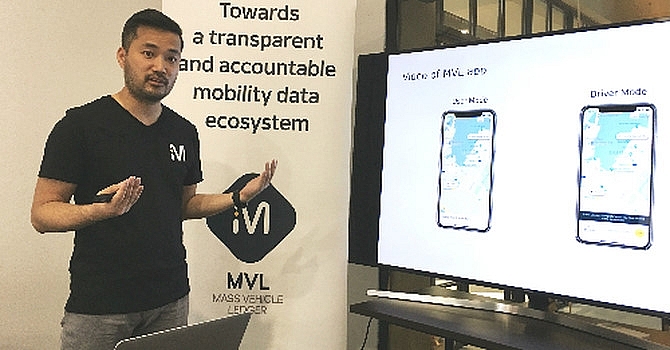MVL Chain to bring blockchain-based ride-hailing app to Vietnam
 |
| MVL Chain from South Korea to bring blockchain-based ride-hailing app for the first time to Vietnam |
Speaking at the introduction conference organised in Ho Chi Minh City on May 5, CEO Kay Woo stated that Vietnam is considered a key market of MVL (Mass Vehicle Ledger) and that the firm submitted the dossiers to establish a legal presence in Vietnam and operate as an IT firm.
MVL will start to recruit drivers within this month and in case the dossiers are approved on time, the firm will launch the app in July. Drivers will not have to pay commission and the company will make a profit from selling data generated from its daily operations to insurance and market survey companies. This way, the firm expects to attract more drivers.
Besides, the firm targets acquiring a 25 per cent market share of all four-wheel and two-wheel vehicles in Vietnam.
According to CEO Kay Woo, the advantage of the firm’s ride-hailing app is using blockchain technology, which utilises a growing list of digital records which are linked and secured using cryptography. A blockchain system can act as a secure, open, and transparent distribution ledger to record transactions between two parties. Blockchain technology can be applied to manage assets, contracts, and global payments.
| Founded in 2012 by a group of mostly Korean founders in New York, the company is now based in Singapore and operates in Korea, Taiwan, Hong Kong, and Singapore via the Easi6 platform which provides reservation services to customers by its system of 25,000 vehicles. |
Kay Woo added that along with the advantage of using blockchain technology, the firm will focus on luring in customers via a low-fare policy instead of pouring money into promotion programmes like Grab and Uber.
Along with MVL, international and local firms are ready to join the ride-hailing race. The Fastgo ride-hailing app is ready to be launched after three years of software development. The app is built by Mpos Vietnam Technology JSC after the order of a large-scale taxi firm from Indonesia and Taxi Open99 Group from Vietnam.
Fastgo offers advantages for both drivers and customers. Notably, with the exception of a fee to join the app, drivers will not have to pay commission to the operators of Fastgo.
Customers will enjoy lower fares than with both traditional taxi brands and Grab. Besides, customers will be insured against any incident occurring during the trip, including traffic accidents or personal injured due to conflict with the driver.
Besides, Phuong Trang Futa Group, a leading passenger transportation and parcel delivery company in Vietnam, invested VND2.2 trillion ($96.53 million) into developing the ride-hailing app Vivu and changed its name into Vato.
Vato will not lure in customers via promotion programmes. Instead, it will offer numerous advantages compared to its competitors.
Notably, drivers and customers can discuss the fare based on an initial fare issued by Vato. For example, after a customer orders a vehicle for a 5-kilometre ride, Vato will offer a fare of VND50,000, which the customer can then discuss with the driver.
Besides, Vato’s base fare is VND8,500 per kilometre (similar to the fare of Uber), however, it only charges a 20 per cent commission, 5 per cent less than Uber.
Furthermore, once customers download the Vato app, they will be able to order vehicles from other taxi firms, including Mai Linh and Vinasun.
Furthermore, China-based ride-hailing player Didi Chuxing is waiting for the Vietnamese government’s approval to start operations in the country. In addition, motorcycle ride-hailing transportation provider Go-Jek from Indonesia has gathered a team of experts to advise its expansion in Vietnam to break the dominance of Grab.
What the stars mean:
★ Poor ★ ★ Promising ★★★ Good ★★★★ Very good ★★★★★ Exceptional
Themes: Ride-hailing services
Related Contents
Latest News
More News
- VinaCapital launches Vietnam's first two strategic-beta ETFs (February 26, 2026 | 09:00)
- PM sets five key tasks to accelerate sci-tech development (February 26, 2026 | 08:00)
- PM outlines new tasks for healthcare sector (February 25, 2026 | 16:00)
- Citi report finds global trade transformed by tariffs and AI (February 25, 2026 | 10:49)
- Vietnam sets ambitious dairy growth targets (February 24, 2026 | 18:00)
- Vietnam, New Zealand seek level-up in ties (February 19, 2026 | 18:06)
- Untapped potential in relations with Indonesia (February 19, 2026 | 17:56)
- German strengths match Vietnamese aspirations (February 19, 2026 | 17:40)
- Vietnam’s pivotal year for advancing sustainability (February 19, 2026 | 08:44)
- Strengthening the core role of industry and trade (February 19, 2026 | 08:35)

 Tag:
Tag:


















 Mobile Version
Mobile Version